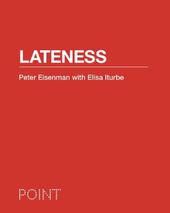
|
Lateness
Hardback
Main Details
| Title |
Lateness
|
| Authors and Contributors |
By (author) Peter Eisenman
|
|
By (author) Elisa Iturbe
|
|
Preface by Sarah Whiting
|
| Series | POINT: Essays on Architecture |
|---|
| Physical Properties |
| Format:Hardback | | Pages:120 | | Dimensions(mm): Height 186,Width 149 |
|
| Category/Genre | Theory of architecture
History of architecture |
|---|
| ISBN/Barcode |
9780691147222
|
| Classifications | Dewey:720.1 |
|---|
| Audience | | Tertiary Education (US: College) | | Professional & Vocational | |
|---|
| Edition |
Flexibound
|
| Illustrations |
39 b/w illus.
|
|
Publishing Details |
| Publisher |
Princeton University Press
|
| Imprint |
Princeton University Press
|
| Publication Date |
7 July 2020 |
| Publication Country |
United States
|
Description
A provocative case for historical ambiguity in architecture by one of the field's leading theorists. Conceptions of modernity in architecture are often expressed in the idea of the zeitgeist, or 'spirit of the age,' an attitude toward architectural form that is embedded in a belief in progressive time. Lateness explores how architecture can work against these linear currents in startling and compelling ways. In this incisive book, internationally renowned architect Peter Eisenman, with Elisa Iturbe, proposes a different perspective on form and time in architecture, one that circumvents the temporal constraints on style that require it to be 'of the times'-lateness. He focuses on three twentieth-century architects who exhibited the qualities of lateness in their designs: Adolf Loos, Aldo Rossi, and John Hejduk. Drawing on the critical theory of Theodor Adorno and his study of Beethoven's final works, Eisenman shows how the architecture of these canonical figures was temporally out of sync with conventions and expectations, and how lateness can serve as a form of release from the restraints of the moment. Bringing together architecture, music, and philosophy, and drawing on illuminating examples from the Renaissance and Baroque periods, Lateness demonstrates how today's architecture can use the concept of lateness to break free of stylistic limitations, expand architecture's critical capacity, and provide a new mode of analysis.
Author Biography
Peter Eisenman is founder and principal of Eisenman Architects and visiting professor at the Yale School of Architecture. His many books include Written into the Void: Selected Writings, 1990-2004 and Tracing Eisenman. Elisa Iturbe is cofounder of the firm Outside Development and a critic at the Yale School of Architecture and the Irwin S. Chanin School of Architecture at the Cooper Union. Sarah Whiting is Dean and Josep Lluis Sert Professor of Architecture at the Harvard University Graduate School of Design.
Reviews"Peter Eisenman, Winner of the Kanter Tritsch Medal for Excellence in Architecture and Environmental Design, University of Pennsylvania Stuart Weitzman School of Design" "The arguments . . . . written here with Iturbe in such an exceptionally didactic and succinct way, and illustrated so unmistakably, as to be rare amid the current proliferation of obscure and turgid architectural theories."---Preston Scott Cohen, The Week "Lateness is the latest in a series of analogies and concepts that Peter Eisenman has used to interpret architecture, and that have defined the analytic methods that have made him a great teacher throughout his career. . . . The arguments . . . are written . . . in such an exceptionally didactic and succinct way, and illustrated so unmistakably, as to be rare amid the current proliferation of obscure and turgid architectural theories. . . . What really stands out are the penetrating formal analyses of the selected exemplars."---Preston Scott Cohen, Architectural Record "In a time when our neo-modern zeitgeist has resulted in increased isolation through the guise of individualism, Eisenman and Iturbe here offer up an alternative perspective-something outside our fixation with conventions and universality, probing the possibility of a world view that is free of the shackles of form and time. Lateness will be of value to both students using parametric tools, alongside their professors who continue to teach Venturi and Giedion's critical discourses, with the book's authors providing food for thought in our digital age, as well as being an update to Benjamin's famous angel of history."---Sean Ruthen, Spacing "Novel...Lateness has to be lauded for its attempt to sort out an architect's relation to and engagement with history and time. - Michael Bell, CAA.Reviews"
|